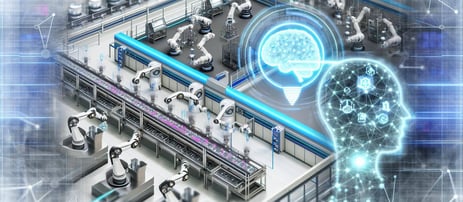Quality by Design: Enhancing Pharmaceutical Manufacturing through PlanetTogether and SAP Integration
Enhance pharmaceutical production with Quality by Design through PlanetTogether and SAP integration, ensuring consistency, compliance, and...
Unlock the power of AI integration for quality control & optimization in pharmaceutical manufacturing. Seamlessly connect PlanetTogether with top ERP systems.
In recent years, advancements in artificial intelligence (AI) have opened up new possibilities for optimizing processes and enhancing quality control in pharmaceutical manufacturing.
In this blog, we look into the implementation of AI solutions, exploring how they can revolutionize your operations and drive success. Specifically, we'll examine how integrating AI with leading enterprise resource planning (ERP) systems like SAP, Oracle, Microsoft, Kinaxis, or Aveva, through platforms like PlanetTogether, can bring about transformative change.
The convergence of AI technologies with advanced manufacturing software presents a transformative opportunity for pharmaceutical facilities to achieve unprecedented levels of operational excellence. Let’s explore how this integration can revolutionize your manufacturing operations.

The pharmaceutical industry operates under stringent regulations and demands uncompromising quality standards. Traditional methods of quality control and optimization often fall short in meeting these requirements efficiently. Here's where AI steps in.
AI-powered systems can analyze vast amounts of data in real-time, identifying patterns, anomalies, and opportunities for improvement that may go unnoticed by human operators. From production line monitoring to predictive maintenance and supply chain optimization, AI has the potential to revolutionize every aspect of pharmaceutical manufacturing.
![]()

To fully harness the power of AI for quality control and optimization, seamless integration with ERP systems is essential. ERP systems such as SAP, Oracle, Microsoft Dynamics, Kinaxis RapidResponse, and Aveva MES provide the foundation for managing manufacturing operations, including production planning, inventory management, and resource allocation.
Integrating AI solutions like PlanetTogether with ERP systems offers several benefits:
Data Synchronization: Integration allows for the seamless exchange of data between AI systems and ERP systems, ensuring that decision-makers have access to accurate and up-to-date information for planning and optimization.
Streamlined Workflows: AI algorithms can analyze data from ERP systems to optimize production schedules, allocate resources efficiently, and minimize downtime. This streamlines manufacturing workflows and improves overall operational efficiency.
Enhanced Decision-Making: By combining AI insights with ERP data, Operations Directors can make informed decisions to optimize production processes, improve resource utilization, and ensure compliance with regulatory requirements.
Enhanced Quality Assurance: By analyzing historical production data, AI algorithms can identify quality trends, detect anomalies, and predict potential deviations in real-time. This proactive approach enables early intervention, reducing the risk of product defects and ensuring compliance with regulatory standards.
Optimized Production Scheduling: AI-powered optimization algorithms integrated with PlanetTogether and ERP systems can dynamically adjust production schedules based on demand fluctuations, resource availability, and production constraints. This agile scheduling approach minimizes idle time, maximizes equipment utilization, and accelerates time-to-market for pharmaceutical products.
Predictive Maintenance: Leveraging AI algorithms for predictive maintenance, Operations Directors can anticipate equipment failures, schedule maintenance activities proactively, and minimize unplanned downtime. This predictive maintenance approach ensures uninterrupted production processes, reduces maintenance costs, and extends the lifespan of critical assets.
Inventory Optimization: By analyzing demand forecasts, production schedules, and supply chain dynamics, AI-powered inventory optimization algorithms can optimize inventory levels, reduce carrying costs, and prevent stockouts or overstock situations. This ensures smooth supply chain operations, minimizes waste, and enhances overall cost efficiency.
While the benefits of AI integration in pharmaceutical manufacturing are undeniable, implementation may pose challenges. From data security and privacy concerns to organizational resistance to change, navigating the complexities of AI adoption requires careful planning and execution.
To overcome these challenges and maximize success, Operations Directors should:
The implementation of AI for quality control and optimization holds tremendous promise for pharmaceutical manufacturers. By integrating AI platforms like PlanetTogether with leading ERP systems such as SAP, Oracle, Microsoft, Kinaxis, or Aveva, Operations Directors can unlock new levels of efficiency, agility, and competitiveness.
Embracing AI is not just about adopting new technologies; it's about transforming processes, empowering people, and driving sustainable growth. As we look to the future of pharmaceutical manufacturing, let's embrace the power of AI to shape a better tomorrow.
Are you ready to take your manufacturing operations to the next level? Contact us today to learn more about how PlanetTogether and integrated scheduling solutions can help you achieve your sustainability goals and drive success in the pharmaceutical industry.
Enhance pharmaceutical production with Quality by Design through PlanetTogether and SAP integration, ensuring consistency, compliance, and...
Unlock the potential of real-time control in chemical manufacturing with seamless integration between PlanetTogether and ERP/SCM/MES systems for...
Enhance quality control in medical manufacturing by integrating PlanetTogether with ERP systems like SAP, Oracle, and Microsoft for real-time,...
Be the first to know about new B2B SaaS Marketing insights to build or refine your marketing function with the tools and knowledge of today’s industry.